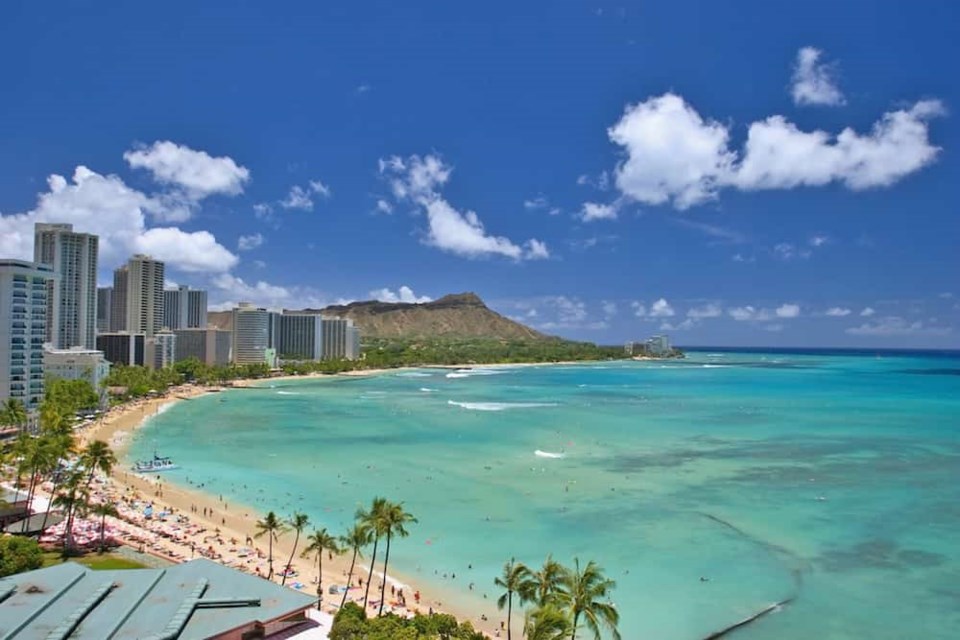Several Canadian politicians have come under fire for vacationing south of the border, and travel data from the State of Hawaii shows that thousands of flights departed from Canada to the tropical state over the past couple of months.
The State of Hawaii's Safe Travels Digital Platform portal shows data on all of the fights that came into the country during the pandemic, including the airport of departure, what the reason for the visit was, the exemption to be able to visit Hawaii, accommodation upon arrival, and the airline.
Since Nov. 1, 2020, a staggering 4,415 people have flown from Canada to Hawaii.
Most travellers from Canada departed from Calgary International Airport, with a total of 2,598 people leaving from the Albertan airport. Of them, the majority of travellers--2,168 people--visited Maui, while 428 visited Honolulu. The majority of travellers (2,207) say they were visiting for pleasure.
The second-highest number of Canadian travellers departed from Vancouver International Airport, with 1,781 travellers arriving from B.C.'s largest airport.
Roughly half of these travellers went to Maui (888) and the others went to Honolulu (847). The majority of travellers (1,304) say they were visiting for pleasure. After that, 187 travellers were airline crew and 183 were "visiting friends or relatives."
Following Vancouver, 20 travellers departed from Toronto's Lester B. Pearson International Airport, while 16 of them departed from Edmonton International Airport.
Avoid non-essential travel
While there currently isn't a law against travel outside of Canada during the pandemic, the federal government says you should avoid non-essential travel outside Canada until further notice.
Further, provincial governments across the country have enacted their own travel advisories. Health officials, including Provincial Health Officer Dr. Bonnie Henry and Health Minister Adrian Dix in B.C., continue to encourage locals to stay in their communities and stress that doing so will help to slow the spread of COVID-19.
If you choose to travel despite these advisories, the Government of Canada highlights that:
- you may have difficulty obtaining essential products and services
- you may have limited access to timely and appropriate health care
- you may suddenly face strict movement restrictions and quarantines at designated facilities and at your own cost
- your insurance may not cover your travel or medical expenses
- we may have limited capacity to offer you consular services.
Everything you need to know about Canada's new COVID-19 travel requirements
Earlier this week, Transport Minister Marc Garneau issued an Interim Order formalizing the new COVID-19 testing requirements for all air travellers coming into Canada.
In a news release, the Government of Canada notes that the COVID-19 pandemic is having a significant impact on the air industry as well as travellers. As such, it has enacted several measures to ensure the health and safety of Canadians, and to prevent the spread of the virus and variants of the virus in the country.
Effective midnight (E.S.T.) on Jan. 7, 2021, regardless of citizenship, all travellers five years of age or older must provide proof of a negative laboratory test result for COVID-19 to the airline prior to boarding a flight to Canada. The test must be performed using one of two types of COVID-19 tests–either a molecular polymerase chain reaction (PCR) or Loop-mediated Isothermal Amplification (LAMP)–and must be conducted within 72 hours of the traveller’s scheduled departure to Canada.
No quarantine exemptions
Anyone who receives a negative test result and is authorized to enter Canada must still complete the full, mandatory 14-day quarantine, unless exempted under the Quarantine Act. Travellers are reminded that ongoing vigilance is still required. In addition to completing their full quarantine period, returning travellers must monitor for signs and symptoms of COVID-19 and submit information electronically through ArriveCAN. If symptoms develop, even if mild, or a positive test for COVID-19 is received once in Canada, travellers are advised to contact local public health authorities.



